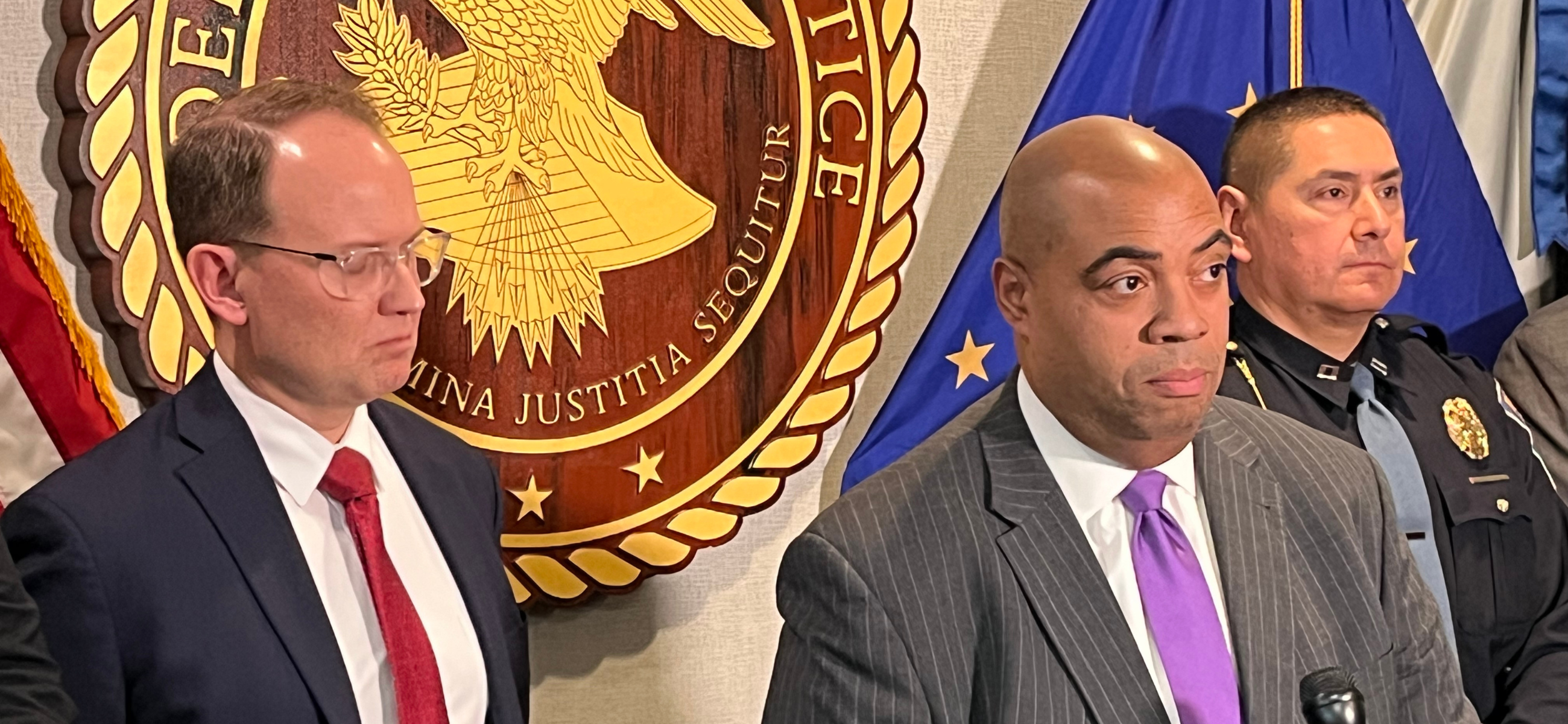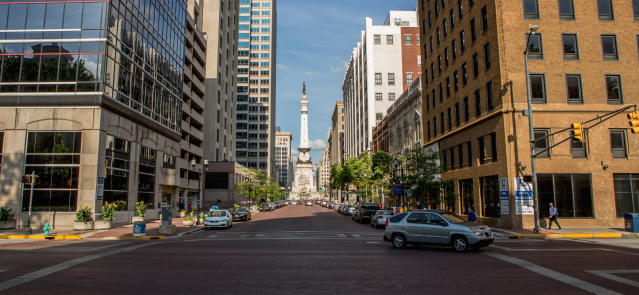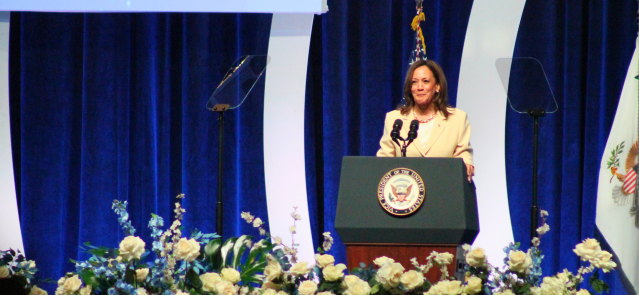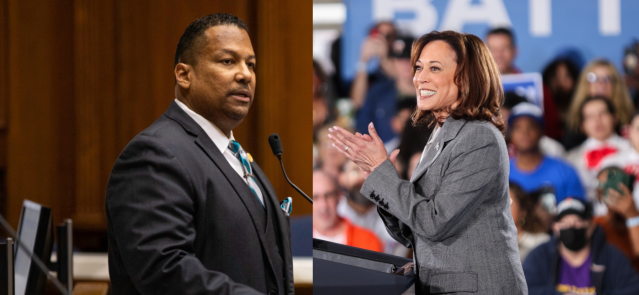Stay ahead of the curve as a political insider with deep policy analysis, daily briefings and policy-shaping tools.
Request a Demo
U.S. Attorney Zachary Myers, center, speaks alongside FBI Indianapolis Special Agent in Charge Herb Stapleton, left, and state police Capt. Ron Galaviz during a news conference about criminal charges against leaders of a now-closed online school on Thursday, Jan. 25, 2024. (Credit: Tom Davies)
Federal investigators say leaders of two shuttered Indiana online charter schools spun a tangled web of shell companies over several years to defraud at least $44 million from the state through inflated student enrollment claims.
The alleged wrongdoing led to a complex investigation that began as the fraud claims became public in 2019 against Indiana Virtual School and Indiana Virtual Pathways Academy. It resulted in a criminal indictment against three top officials of those schools last week and a guilty plea on fraud charges by another.
The indictment charges Thomas Stoughton, who owned the schools, with directing school employees to compile enrollment counts to the state Department of Education that included more than 4,000 students who had never completed enrollment or had not logged in to online classes for months.
Results of lengthy federal investigation
More than $18 million in state money from those padded enrollment counts were funneled through what U.S. Attorney Zachary Myers on Thursday called shell companies and eventually into bank accounts, many of which were controlled by Stoughton or his family members.
Herb Stapleton, special agent in charge of the FBI’s Indianapolis office, said the volume of documents investigators had to plow through was “enormous.”
“It’s really difficult to overstate how challenging these cases can be,” Stapleton said. “Hundreds of thousands of records potentially relevant to the case had to be reviewed and analyzed and categorized. Several hundred bank accounts required forensic attention to determine whether or not any payments being made were payments in furtherance of a fraud. And hundreds of interviews had to be conducted, many of which included interviews of fraudulently enrolled students or their parents.”
The federal indictment charges:
- Stoughton, 74, of Carmel, with one count of conspiracy to commit wire fraud; 16 counts of wire fraud; and 57 counts of money laundering.
- Phillip Holden, 62, of Middletown, the school director overseeing enrollment, with one count of conspiracy to commit wire fraud and 16 counts of wire fraud.
- Percy Clark, 81, of Carmel, superintendent of the online schools, with one count of conspiracy to commit wire fraud; 16 counts of wire fraud; and 11 counts of money laundering.
Christopher King, 61, who prosecutors say oversaw enrollment processing for the schools, has pleaded guilty to conspiracy to commit wire fraud over his role in the alleged scheme and is awaiting sentencing. Myers declined to say whether King was cooperating with investigators.
Stoughton, Holden and Clark face potential prison sentences of 10 to 20 years on each count. A federal magistrate judge has allowed them to remain free pending further court proceedings.
Indianapolis defense attorney James Voyles, who is representing Stoughton, declined State Affairs’ request for comment about the indictment. Defense attorneys for Holden and Clark have not responded to requests for comment.
Total size of the fraud
The federal indictment includes allegations of wrongdoing from 2016 into 2019 and that the schools received at least $44 million fraudulently from the state.
That total is about one-third less than the $69 million in improper payments between 2011 and 2019 alleged in a 2021 lawsuit filed by the state attorney general’s office against Stoughton and others. That lawsuit remains pending in a Hamilton County court — and it is unclear whether any money could be recovered for the state.
Myers said the federal investigation covered a shorter timeframe for the criminal charges.
“We’re limited to the scope of the charges that we brought at this time,” Myers said. “I believe that the attorney general’s lawsuit is more expansive in terms of the time period.”
Some of the money laundering counts alleged Stoughton was involved in improper payments of about $270,000 toward the purchases of gold coins, a Cadillac sedan and jewelry and tuition payments to Park Tudor school in Indianapolis.
Questions of state oversight
Indiana Virtual School was formed in 2011 soon after a Republican-driven state education overhaul expanded the availability of charter schools, which are privately operated but receive taxpayer funding.
Myers said he was “not really in a position to comment” about whether state officials should have discovered the inflated enrollment counts sooner.
Republican legislative leaders have turned aside complaints from Democrats that some responsibility for the fraud rested with lax state regulations.
Republican House Speaker Todd Huston said Thursday he was glad that prosecutions were moving forward in the case and defended state policies.
“Since that all took place, I know we’ve worked and passed multiple bills dealing with providing more oversight by the [charter school] authorizer, in particular in regards to financial matters,” Huston said.
House Democratic Leader Phil GiaQuinta said he believed the state continued inadequately monitoring the hundreds of millions of dollars going to privately operated charter schools and the state’s private school voucher program.
“Anytime public funding leaves that sphere of oversight, you’re just asking for trouble,” GiaQuinta said.
Tom Davies is a Statehouse reporter for State Affairs Pro Indiana. Reach him at [email protected] or on X at @TomDaviesIND.
X @StateAffairsIN
Facebook @stateaffairsin
Instagram @stateaffairsin
LinkedIn @stateaffairspro
4 things to know about Braun’s property tax proposal
Sen. Mike Braun, the Republican candidate for Indiana’s governor, released a plan for overhauling property taxes Friday morning that would impact millions of Hoosiers, Indiana schools and local governments. “Nothing is more important than ensuring Hoosiers can afford to live in their homes without being overburdened by rising property taxes driven by rapid inflation in …
Bureau of Motor Vehicles looks to add new rules to Indiana’s driving test
The Bureau of Motor Vehicles wants to amend Indiana’s driving skills test, putting “existing practice” into administrative rule. Indiana already fails drivers who speed, disobey traffic signals and don’t wear a seatbelt, among other violations. Yet the BMV is looking to make the state’s driving skills test more stringent. A proposed rule amendment looks to …
In Indianapolis, Harris says she’s fighting for America’s future
Vice President Kamala Harris, the presumptive Democratic presidential nominee, told a gathering of women of color in Indianapolis on Wednesday that she is fighting for America’s future. She contrasted her vision with another — one she said is “focused on the past.” “Across our nation, we are witnessing a full-on assault on hard-fought, hard-won freedoms …
Indiana Black Legislative Caucus endorses Harris, pledges future support
The Indiana Black Legislative Caucus unanimously voted Wednesday to endorse Vice President Kamala Harris’ presidential run and will look at ways to assist her candidacy, the caucus chair, state Rep. Earl Harris Jr., D-East Chicago, told State Affairs. The caucus is made up of 14 members of the Indiana General Assembly, all of whom are …




